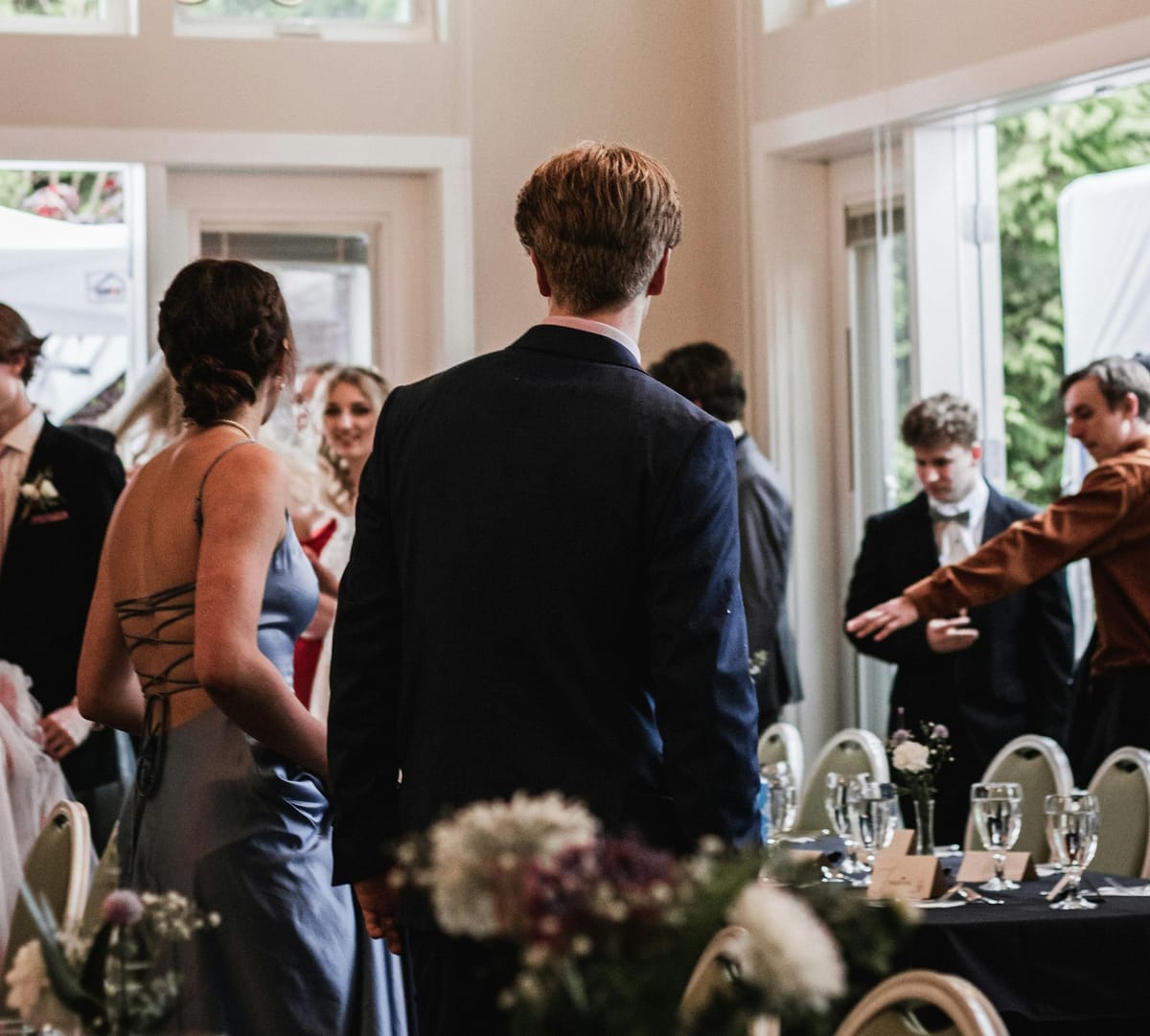Life of the Party: Diplomatic Tips for Hosting Successful Events

Share
“They’re here!” The doorbell rings, and with a smile you welcome your first guests. Sharing a laugh, you welcome them, and with that simple gesture your event begins. Walking back and forth to the door as people arrive, the group is soon complete. The hubbub of conversation fills the place and the food and drinks flow as their smiles grow wider. The exhaustion of putting it all together melts away in the warmth of the moment. Sharing stories, and poking fun at work, time seems to fly by, and before you know it, people are saying goodbye. Congratulations, you have just hosted a successful event.
I am, by nature, a host. I like to bring people together, organize events, and cook. I enjoy good company, meeting people, and making friends. My first instinct when I land in a new country is to find an excuse to invite people to my place. As soon as I connect with a few people, I organize an event. Fortuitously, this worked wonders for me when I began my career as a diplomat.
Whether you're a diplomat integrating into a new post or simply someone looking to build connections through hosting, these practical tips will help you create memorable events with ease.
Over time, I found that hosting events is one of the fastest and most effective (if not the most effective) ways for a diplomat to make friends and integrate into social circles in a new country. Some of the friendships I’ve formed through hosting events have outlasted my postings, and evolved beyond simple professional connections, and span continents and oceans to this day.
While my love for hosting has certainly shaped my approach, I'm going to focus on practical tips that anyone can use, regardless of their natural inclination toward hosting. Here are some key strategies I’ve honed over years of diplomatic life.
Don’t Approach it Like A Chore

Not everyone is a host by nature, I will grant you that. Some find the process tiresome, and others yet prefer quiet evening alone. However, approaching organizing events purely as a task, as something to get over and done with as quickly as possible is a recipe for awkward, rigid, and uncomfortable dinners, with the sound of silverware clicking on plates ringing louder than the conversation.
Unless it’s a purely formal dinner or national day that requires strict adherence to protocol and seniority, the success of your event depends on how enjoyable it is for your guests.
When you treat it purely as a task, rather than crafting a joyful experience, not only will you feel ill at ease in the leadup and during, but you will bring this energy to the event itself. People can perceive when you treat them as a chore, and it raises the level of discomfort for everyone present. Have you ever been to an evening where the energy was off, and it seemed that people could not wait to leave? That is the vibe you create by approaching your preparation with a chore mindset.
On the other hand, when you approach it with the purpose of sharing a good time with people, and create a setting where they are at ease, engage in stimulating conversations, share food and drinks, and go home happy, the entire energy shifts dramatically. People, feeling welcome rather than like a chore, will be delighted to stay and engage with you and others, and look forward to attending future events.
Location, Location, Location!

As a natural host, one of the important factors I consider when choosing my accommodation upon arrival to a new posting is always how practical it is for hosting. If you know you will be holding events at your place on a regular basis, set yourself up for success early by choosing well.
Unless you offer something truly extraordinary at your events, people will be reluctant to go too far out of their way to attend a lunch or dinner. If your house is on the outskirts of town at the top of a winding gravel road, regardless of how beautiful it is you will probably hear more excuses to avoid attending than a school teacher.
Accessibility is an important factor when choosing your accommodation in your new posting. It has to be easy to reach, and easy to get home from. In most cities, there will be areas that the diplomatic corps tends to gravitate to, and those are usually where you want to begin because they are often well located and accessible for your guests.
Having identified where you will settle, make sure that the place itself meets your hosting needs. If you are (like me) an avid cook and like to hand craft the meals you will serve, then a good kitchen is a sine qua non of a good house or apartment. It also should have enough space to accommodate the numbers of guests you seek to welcome; a large group of people cramped in tight quarters is not the hallmark of a comfortable event.
Designer and Decorator
With a well-chosen location in place, the next step is to transform it into a space that is both welcoming and functional. This is where your role as a designer comes into play.
A warm, inviting place can make or break an event. Even with the best food and drink, a poor layout will disorient your guests, and create isolated islands of people that feel disconnected from each other. When you don your interior designer cap, consider the most common style of event you host and layout your place accordingly. For example, if you prefer hosting events where groups flow into each other from one space to another, then you need to adjust the setting of your home accordingly. Make it easy for people to mingle freely and not feel restricted to one place.
As you organize your layout, think of how the light works with the space, and how the furniture guides people. Is it welcoming and accommodating for conversations or is the furniture so far apart that people need to shout at each other from across the room? Are there enough tables spread throughout the room or will people have to awkwardly hold their drinks the whole time? These little details make all the difference in creating a sense of comfort.
When decorating, balance between entirely bare walls that make it feel impersonal and having pictures and pieces scattered on every visible surface. The former makes it seem that the place is not a welcoming home, rather more like an impersonal space rented out for the purposes of the dinner, while the latter sometimes feels like an assault on the senses that takes effort to ignore. A few conversation pieces, a few highlights of where you’ve worked and visited are enough to convey a sense of homeliness and warmth.
It’s All About the People

Congratulations! Your location is excellent, your space is exquisite, and tastefully (even artfully) decorated. It is ready for your events, and while a beautifully designed space sets the stage, the true magic of any event lies in the people you bring together.
For an event to work, you have to make sure your guest list is carefully curated. Remember, the goal is for everyone to leave wanting to come back for the next one, not dreading your next invitation. To make this happen, you have to factor in a few elements into your calculations, and ensure that your guests enjoy more than just the food.
Generally speaking, you have to balance a few considerations, including the age ranges of your guests, as well as their ranks and responsibilities. If there is too wide a gap between the guests, the dynamic will not flow. If they are similar in responsibilities but there is too far an age gap, the conversations will revolve purely around work-related issues, and will not flow organically. If there is too wide a discrepancy of ranks, the dynamic could become more formal and less at ease. When crafting your guest list, you have to ensure enough of an overlap that everyone in attendance finds someone to engage with comfortably.
Preparation is King
It is no secret that a lot of preparation goes into organizing an event, and over the years I have developed a simple formula. I visualize what I want the day to look like, including the food served, the number of people, the timing, the layout, and the background music that I will have playing. I visualize alternatives as well, for example if I had intended for an outdoors event, I would preconceive of how I would rearrange the layout in the event of inclement weather. I also leave myself a few hours buffer for unexpected surprises requiring last minute adjustments.
If you are cooking, make sure that your ingredients are available, obtainable and ready on time. In every posting I always had reliable suppliers on call for all my needs, making sure they could deliver quality every time. I also hired help for the bigger events (anything more than 15 people) to provide service, so that I would not be distracted by catering to a large group and spend the entire time in logistics rather than engaging with my guests. If that is not an option, then keep events at manageable numbers that allow you to spend more time with your guests than handling issues.
Breathe Life into the Party
Even with all the preparation in the world, the real-time dynamics of your event will ultimately determine its success. Now that the everything is in place, and you’ve curated your guest list, people are knocking on your door. They come in, a little hesitant at first, but soon there is conversation going. You scan the room -as you should- and notice that someone is a little sidelined. They are not engaging in conversation, and are looking awkwardly at their drink. You swoop in, start a quick conversation, and gradually guide them into one of the other groups so that they don’t feel left out.
As a host, it is your responsibility to make sure that no one at your event feels left out. Sometimes guests feel out of place, particularly if they are a newcomer to the country and the others have known each other for a long period of time. It is important that you guide them into the groups and make them feel welcome.
It is also your role as conversations fizzle to reignite the flow. Raise new topics, ask the group a question, and in general sustain the momentum of your events. With groups of guests who know each other well that won’t be a core issue, but for guests that are not well acquainted, you are the link that connects them all.
Don’t Worry About Murphy’s Law
“Anything that can go wrong will go wrong,” according to Murphy, and this is why a lot of people have trepidation about hosting events. They worry that with so many moving parts, something will go wrong, and they’ll end up embarrassed. However, unless the event is a formal and official one, requiring strict adherence to protocol, then rather than worry about what can go wrong, simply adopt the adage that whatever goes wrong can be fixed. The approach to formal events is an entirely different one, that I will cover in a dedicated piece.
For less formal events, you don’t need to burden yourself with worry; embracing the unexpected is part of being a good host. If you have prepared everything, and the guest list is well balanced, then anything that goes wrong can be fixed; people are far more understanding that you would expect, and you can often leverage it into an inside joke to share with your guests at later occasions. To quote the Hitchhikers Guide to the Galaxy, don’t panic. If you take it in stride so will everyone else, whereas if you panic and emit negative energy you may derail the momentum of the event.
Remember that through all this, it’s important to enjoy the process. If not that, at least enjoy the outcome, and grow your network and your friendships along the way.



